Celtic Cross Spread
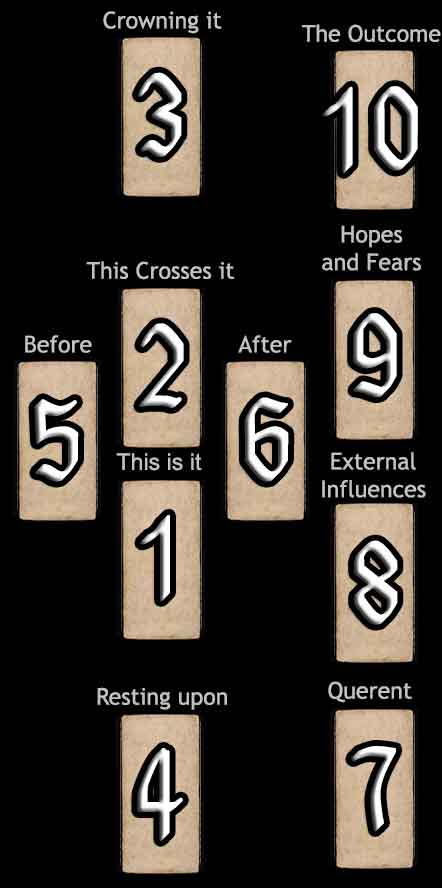
Difficulty: Average
This is probably the most well-known tarot spread. A good, basic spread for beginners to practise with, the Celtic Cross is useful for questions of all types. In this spread, it can be helpful to notice the relationships between the pairings of cards #5 & #9, #1 & #2, #3 & #4, and #6 & #10.
- The significator epitomizes what the reading deals with, the initial situation.
- An added impulse that compounds the significator, which may be either complimentary or contradictory.
- This is what is consciously known (thoughts).
- Unconscious driving forces that may not be known fully (emotions).
- The immediate past regarding the current situation.
- The first future card indicates the immediate future.
- This card represents the reader and their attitude towards cards #1 and #2.
- The external influences, the places and people which influence the topic.
- This tarot card suggests expectations; what is secretly hoped for or feared.
- The second future card reveals the long-term outcome.
Your Celtic Cross Reading
The Crown |
The Outcome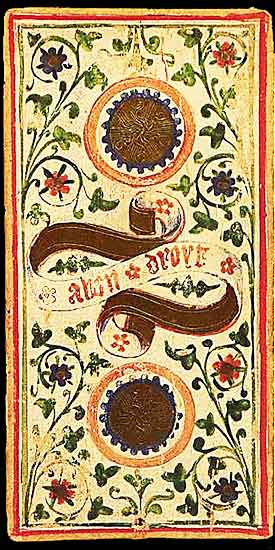 Two of Coins
External Forces 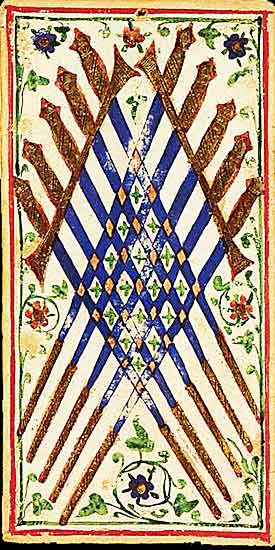 Ten of Swords
|
||
The Recent Past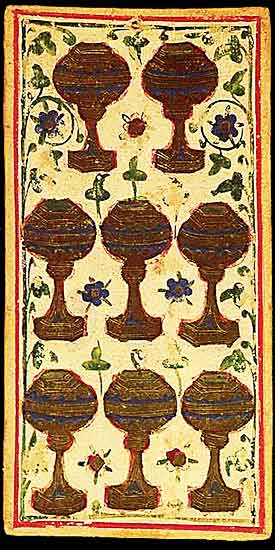 Eight of Cups |
The Crossing Card
|
The Future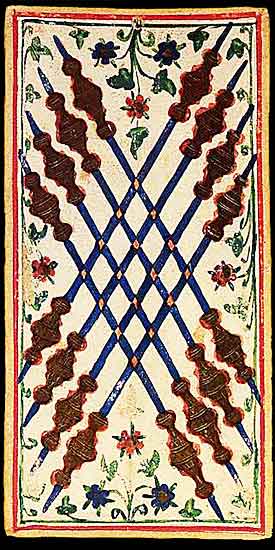 Eight of Staves |
|
|
|||
The Significator represents what the main theme of the reading deals with, the initial situation.
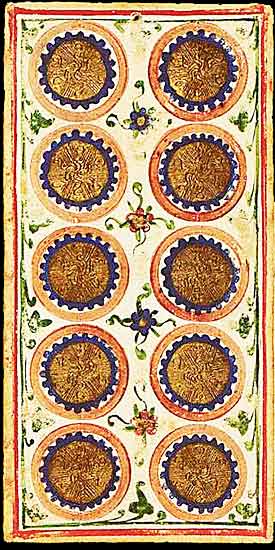
Ten of Coins
The Ten of Coins signifies wealth, legacy, and long-term success. It represents a culmination of efforts that have resulted in financial stability and the ability to pass on a legacy. This card celebrates family, heritage, and the fulfilment of long-term goals.
Symbolism: The symmetrical arrangement of ten coins emphasises completion, legacy, and the culmination of a journey. The rich details of the coins reflect the lasting impact of your achievements.
In Relationships: Stability, commitment, and family. The Ten of Coins speaks to building a lasting foundation for future generations and finding fulfilment in long-term relationships.
In Work: A time of financial abundance and career success. This card indicates that you have achieved a stable and prosperous position, and your legacy is secure.
Spiritually: A sense of fulfilment and the ability to pass on wisdom to future generations. The Ten of Coins encourages you to focus on leaving a lasting, positive legacy.
When ill-dignified: Stagnation, generational wealth without purpose, or difficulty passing on your legacy. The Ten of Coins warns against becoming too focused on material wealth at the expense of relationships or spiritual growth.
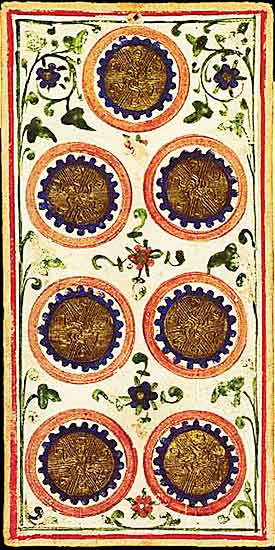
The Crossing Card denotes an added impulse that compounds the initial card, whether complimentary or contradictory.
Seven of Coins
The Seven of Coins represents patience, investment, and assessment. It signifies a time to step back and evaluate the progress of your efforts. This card emphasises the importance of patience and the need to wait for the fruits of your labour to manifest.
Symbolism: The irregular arrangement of the seven coins suggests growth, progress, and the anticipation of results. Their grouping represents the natural rhythm of growth, with some efforts taking longer to bear fruit than others.
In Relationships: Reflecting on the progress of a relationship and taking stock of where things are headed. The Seven of Coins encourages patience and careful assessment before making major decisions.
In Work: Evaluating your career progress and investments. This card advises you to assess the returns of your efforts, as growth may be gradual.
Spiritually: A time of spiritual assessment, where you evaluate your progress on your path. The Seven of Coins encourages patience and trust in the process.
When ill-dignified: Impatience, frustration, or lack of faith. The Seven of Coins warns against rushing or abandoning your efforts prematurely.

The Crown stands for what the asker is aware of consciously.
XI – Strength
Strength symbolises courage, patience, and the mastery of inner power. It reflects the triumph of compassion and self-control over brute force.
Symbolism: The figure's calm restraint of the lion reflects the balance of strength and gentleness. Her finely detailed garments and the rendering of the lion's mane reflect Renaissance artistry, while the golden background elevates the scene to a symbolic level.
In Relationships: A time to practise patience and understanding. Strength signals harmony through compassion.
In Work: Success through persistence and confidence. Strength encourages inner resolve rather than aggressive tactics.
Spiritually: Strength represents mastering the ego and cultivating inner peace through compassion.
When ill-dignified: Aggression, self-doubt, or weakness. It warns against succumbing to fear or forceful behaviours.
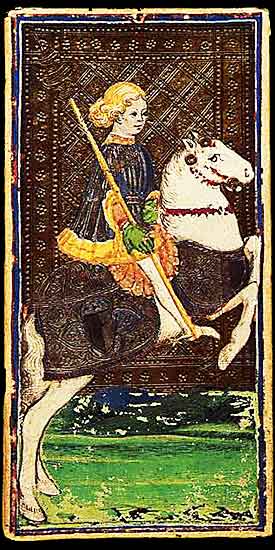
Foundation card reveals unconscious driving forces that the querent may not be aware of.
Knight of Staves
The Knight of Staves represents energy, action, and adventure. This card signifies someone who is driven, determined, and fearless in the pursuit of their goals.
Symbolism: The Knight riding a white horse, holding a staff, exudes power and motion. The horse's rearing pose conveys energy, while the knight's noble attire suggests refinement and authority. The background patterns reinforce the balance between dynamism and structure in his approach.
In Relationships: Boldness and action in your romantic life. The Knight of Staves signifies a passionate pursuit, whether the beginning of a thrilling romance or an energising reconnection.
In Work: Ambition, action, and boldness in your professional life. The Knight encourages you to take swift, passionate action towards your goals.
Spiritually: Rapid spiritual movement and growth. The Knight of Staves urges you to pursue your spiritual goals with energy, fearlessness, and determination.
When ill-dignified: Recklessness, impulsivity, or lack of thought. You may be moving too fast or charging ahead without considering the full implications of your actions.

The Recent Past represents past events and concerns.
Eight of Cups
The Eight of Cups represents emotional departure, seeking something deeper, and the decision to walk away from what no longer serves you. It speaks to the need for introspection and self-discovery, as you leave behind the superficial in search of deeper meaning.
Symbolism: The eight chalices in staggered rows suggest a gradual departure or transition. The placement emphasises movement and emotional progression. The ornate details of the cups reflect the emotional investment required to make this decision.
In Relationships: A decision to move on from a relationship or emotional situation that no longer fulfils you. This card represents a quest for deeper connection or personal growth.
In Work: Leaving behind a job or situation that no longer aligns with your values or goals. The Eight of Cups suggests you are ready to pursue something more meaningful.
Spiritually: The journey towards deeper spiritual fulfilment. This card invites you to leave behind outdated beliefs or practices in search of greater understanding.
When ill-dignified: Running away from emotional problems or avoiding growth. The Eight of Cups warns against making impulsive decisions or leaving before you've fully processed emotions.

The Future depicts that which lies ahead.
Seven of Coins
The Seven of Coins represents patience, investment, and assessment. It signifies a time to step back and evaluate the progress of your efforts. This card emphasises the importance of patience and the need to wait for the fruits of your labour to manifest.
Symbolism: The irregular arrangement of the seven coins suggests growth, progress, and the anticipation of results. Their grouping represents the natural rhythm of growth, with some efforts taking longer to bear fruit than others.
In Relationships: Reflecting on the progress of a relationship and taking stock of where things are headed. The Seven of Coins encourages patience and careful assessment before making major decisions.
In Work: Evaluating your career progress and investments. This card advises you to assess the returns of your efforts, as growth may be gradual.
Spiritually: A time of spiritual assessment, where you evaluate your progress on your path. The Seven of Coins encourages patience and trust in the process.
When ill-dignified: Impatience, frustration, or lack of faith. The Seven of Coins warns against rushing or abandoning your efforts prematurely.
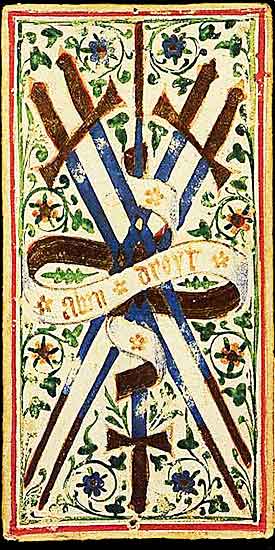
The Querent represents the asker and their attitude towards the subject of the reading.
Five of Swords
The Five of Swords represents conflict, competition, and mental struggle. It suggests a situation where victory may come at a cost, with tension and discord present. This card can indicate a win achieved through manipulation, dishonesty, or at the expense of others.
Symbolism: The swords are arranged in an unbalanced formation of four-on-one, highlighting the disharmony and imbalance created by conflict. The uneven positioning of the blades reflects the instability caused by mental or emotional discord, while their fine craftsmanship hints at the complexity of the situation.
In Relationships: Conflict or mental challenges. The Five of Swords suggests that a fight or disagreement may have left scars, and one must decide whether to continue fighting or walk away.
In Work: A competitive or combative environment. This card warns that achieving success at the expense of others may lead to resentment or long-term harm.
Spiritually: Mental conflict or inner turmoil that disrupts your peace of mind. The Five of Swords advises resolving spiritual disputes and finding reconciliation within yourself.
When ill-dignified: Deception, defeat, or unnecessary conflict. The Five of Swords warns against manipulative behaviour or unnecessary mental battles that lead to no real resolution.

External Forces represents the influence of others in your life as well as trends in your relationships with others.
Ten of Swords
The Ten of Swords signifies an overwhelming and painful ending. It suggests a situation that has reached its breaking point, often after a period of mental or emotional strain. This card points to the finality of a difficult chapter and the potential for renewal after a painful conclusion.
Symbolism: The array of ten swords represents the intensity of betrayal, loss, or defeat. The overwhelming nature of the arrangement emphasises the depth of the crisis. The contrast between the swords and the flowered background highlights the gravity of the situation and the possibility of a new beginning once the pain subsides.
In Relationships: A painful breakup or emotional betrayal. The Ten of Swords marks the end of a challenging relationship or emotional chapter but also signals the opportunity for healing.
In Work: The culmination of a difficult period at work, possibly signalling job loss or failure. This card suggests that, while painful, the end of this chapter clears the way for new opportunities.
Spiritually: A painful spiritual awakening or crisis. The Ten of Swords invites you to embrace the lessons learned and recognise that endings often bring new beginnings.
When ill-dignified: A protracted period of suffering or an unwillingness to move on from the past. The Ten of Swords warns against dwelling in pain or allowing it to define you.
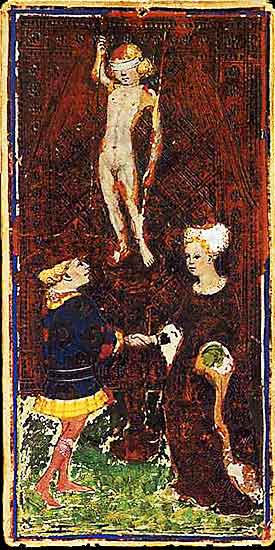
Hopes and Fears shows the expectations you have concerning the outcome of your question.
VI – The Lovers
The Lovers represent choice and the uniting of opposites. It embodies the transformative power of love and the necessity of making meaningful decisions.
Symbolism: The young couple standing beneath Cupid symbolises connection and divine guidance in love. The formal Renaissance clothing and the golden background elevate their union to a sacred level, while the static composition emphasises balance and deliberate choice.
In Relationships: A powerful connection that unites hearts and souls. It may signify a new relationship or a pivotal choice in love.
In Work: A partnership or decision with far-reaching consequences. The Lovers encourage the alignment of values with your work.
Spiritually: The Lovers symbolise unity with your higher self and the harmonious integration of opposites.
When ill-dignified: Temptation, discord, or indecision. It warns against superficial connections or poor choices.

The Outcome of your question. Interpret this card in the context of the entire reading and as an indicator of the path you are currently on, but not necessarily bound to.
Two of Coins
The Two of Coins signifies balance, adaptability, and juggling multiple responsibilities. It represents the need to find harmony between different areas of your life, such as work and home, or managing various projects. This card encourages you to be flexible and adaptable, finding ways to keep everything in motion.
Symbolism: The symmetrical placement of the coins highlights balance and duality. The harmonious design suggests that while there is a need to manage different aspects of life, it is possible to do so successfully with care and focus.
In Relationships: Balancing responsibilities. This card suggests you must strike a balance to maintain a stable and fulfilling partnership.
In Work: A time to juggle multiple roles or responsibilities at work. The Two of Coins advises flexibility and time management to ensure success.
Spiritually: Finding the balance between the material and spiritual aspects of life. The Two of Coins encourages you to integrate both into a cohesive whole.
When ill-dignified: Overwhelm, imbalance, or struggling to manage responsibilities. The Two of Coins warns against neglecting one area of life for another.